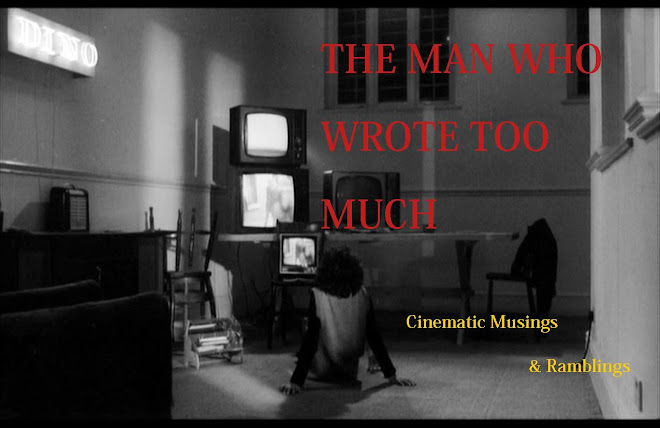We don’t have to look far to find examples of this, from his infamous exploits with Kinski bringing to life egomaniacal adventurers bounding along the Amazon and through the jungle in Aguirre: The Wrath of God (1972) and Fitzcarraldo (1982), to his documentaries charting the lives of people who choose to outcast themselves in some of the world’s most inhospitable places such as the Sahara in Fata Morgana (1971), Antarctica in Encounters at the End of the World (2007) and in Alaska with a shit load of hungry Bears in Grizzly Man (2005).
+1.JPG)
The Great Ecstasy of the Woodcarver Steiner proves to be one of the greatest examples of this auteurist trait. Following an astounding opening sequence in which we see a ski ‘flight’ played to us at 1/20th speed set to the mesmeric tones of regular Herzog collaborator Popol Vuh. We meet the titular Walter Steiner, a gangly and unassuming young Swiss man with a penchant for woodcraft and throwing himself 170 metres through the air off ramps with only a pair of sticks on his feet for protection.
Here we enter the mad world of Ski-flying, that’s right, not ski-jumping, but its altogether more extreme offshoot ski flying. Rather than attempt to contextualise the event for us, and attempt meaningful psychological examination of those who take part, Herzog explains it all with the previously mention super slow speed camera footage. This stunning imagery captures perfectly the sheer euphoria (or ecstasy) the competitors feel upon embracing the closest we can come to the grace of flight without evolving ourselves a pair of wings.
+2.JPG)
Unfortunately, the graceful flight is often not met with an equally decorative landing, and we also get to witness what happens when it all goes horrifically wrong upon returning to terra firma. Though rather than some garish ESPN style ‘When Ski-Flights go wrong!” exploitation, Herzog even lends these scenes an elegiac touch.
It is this conflict of the ecstasy versus the danger that we find Steiner caught it. Steiner was at the time the most amazing ski-flyer the world had ever seen, other top competitors it seemed even avoided events he was involved in, as whatever length the pack would set, Steiner would throw on another 30 metres. This leads to an event in Yugoslavia where Steiner crushes previous records to such an extent that he is left with little safety run off, culminating in him having a bad fall, leaving him bloodied and concussed.
+3.JPG)
It is here that the film becomes especially interesting, as Steiner wishes to leave the event, but the organisers begin to apply pressure, demanding he perform again for the paying audiences. Here the film begins to raise questions of an athlete’s responsibility to his fans, as Steiner becomes convinced that they only come to watch because of a car-crash mentality bloodlust, waiting for the moment when he pushes the limits just one step too far. We leave Steiner as a melancholy character unsure of his future within the sport.
In a back catalogue peppered liberally with must see pictures, I’d go as far to say that The Great Ecstasy of Woodcarver Steiner is right up there with the very best of Herzog’s oeuvre. He always seems to be at his best when he transcends the sometimes quotidian seeming nature of the subjects he chooses and wraps them in a dreamlike weave, blurring lines between documentation of an event and artful romanticism. Nowhere is that better found than here.

The Great Ecstasy of the Woodcarver Steiner was amazing. I just watched it for the first time. What Herzog captures in those flying scenes is a man transformed into something else. Steiner's quote of wishing to be alone with nothing but the sky, perched atop a high rock at the end of the film is all the more poignant following such amazing imagery. Popul Vuh's score, as ever plays an amazing role in propping up the transcendent imagery.
ReplyDelete